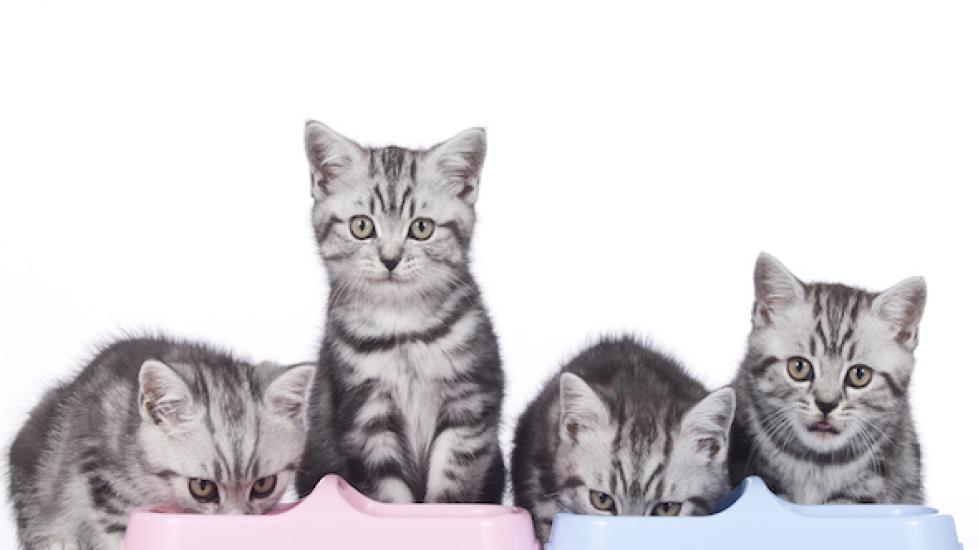The Right Foods for Kittens
Kittens need certain nutrients to grow strong bones and muscles, to feed their developing brains, and to build their immune systems. There are a lot of foods on the market. Some foods are obviously made for specific life stages, and they say as much on the packaging, while other foods appear to cover all of life's stages of development. Keeping in mind that starting off well is important for your cat's long term health and life, you will want to choose the food that is tailored to meet your kitten's needs during this crucial stage, or you may find yourself having to pay later in veterinary services, medications and special diets.
Once you are familiar with your kitten's nutritional requirements, and what ingredients you need to look for, choosing the right food will be a snap.
Carbohydrates and Protein
First. it is important to consider that cats are strictly carnivorous. They do not subsist on vegetables or carbohydrates, so animal meat proteins should be the main component of a kitten's diet. If your cat does not receive the correct amount of meat proteins, his body will be deficient and will break down its own muscle in an attempt to provide those nutrients. Animal protein is essential for the healthy growth of muscle and tissue, supplying essential amino acids, the building blocks of tissues.
Some amino acids are more important that others. For example, an important amino acid for kittens (and cats) is taurine. Taurine is necessary for the normal performance of the heart, vision, and reproduction. Without it, cats will go blind and suffer from cardiac problems. This amino acid can only be found in meat sources and must be a part of a healthy daily diet.
A lot of cat foods are made with carbohydrates and grains, they are hard to avoid, but these ingredients should make up a very small percentage of the food. Too much carbohydrates in a cat's diet can cause intestinal problems and excessive weight gain at the worst.
Fats: They're Good for Your Kitten – Really!
Fats are an important component in the diet of young cats, helping to absorb important vitamins, such as vitamin A, D, E and K, and adding flavor to the food to increase enjoyment. Fats are also an excellent source of energy for cats and also serve to add oils to the body to maintain healthy skin and hair coats. A diet too low in fats can result in dry, scaly skin, increasing the likelihood of skin infection.
Far from being bad for the health, fats and fatty acids are necessary for strong development in kittens. Kittens in particular must be fed a source of arachidonic fatty acids. These acids are essential for blood clotting and skin growth.
Kittens also need linoleic acid for a healthy inflammatory response.
Vitamins and Minerals
For the development of bones and teeth, vitamins and minerals such as calcium, phosphorus, and vitamin D are needed. The ratio and amount of these nutrients is especially important for maximizing skeletal density and stability. Lack of vitamin and mineral balance in kitten-hood often will result in bone and joint problems later. For kittens - and cats - there are special needs for vitamins A and B, along with thiamin and niacin.
What to Avoid
It is best to stick to a formula that is tailored just for kittens. While it is tempting to share some of your people food with them, avoid foods like canned tuna or other fish — fresh or canned — which can lead to thiamine deficiency; milk, which can cause diarrhea; raw meat, a common source of salmonella and E.coli; and raw eggs, which can cause a deficiency of biotin and are also a source of salmonella.
A Balanced Diet for Growth
Do your research and talk to an expert if necessary. Your veterinarian or animal nutritionist can help you to select a complete and balanced commercial diet that will meet your growing kitten's needs. Some breeds need a more tailored diet depending on their expected growth potential, but in general, all cats require the same balance of ingredients.
In addition, unless your veterinarian has explicitly advised it, do not give your cat separate vitamin or mineral supplements while she is still in the growing phase of her development. Over-supplementation can be dangerous, possibly leading to improper skeletal development and other health issues. A complete and balanced kitten food should provide every nutrient necessary, without the need for added supplements.
Good luck, and good growing!
Image via Shutterstock
